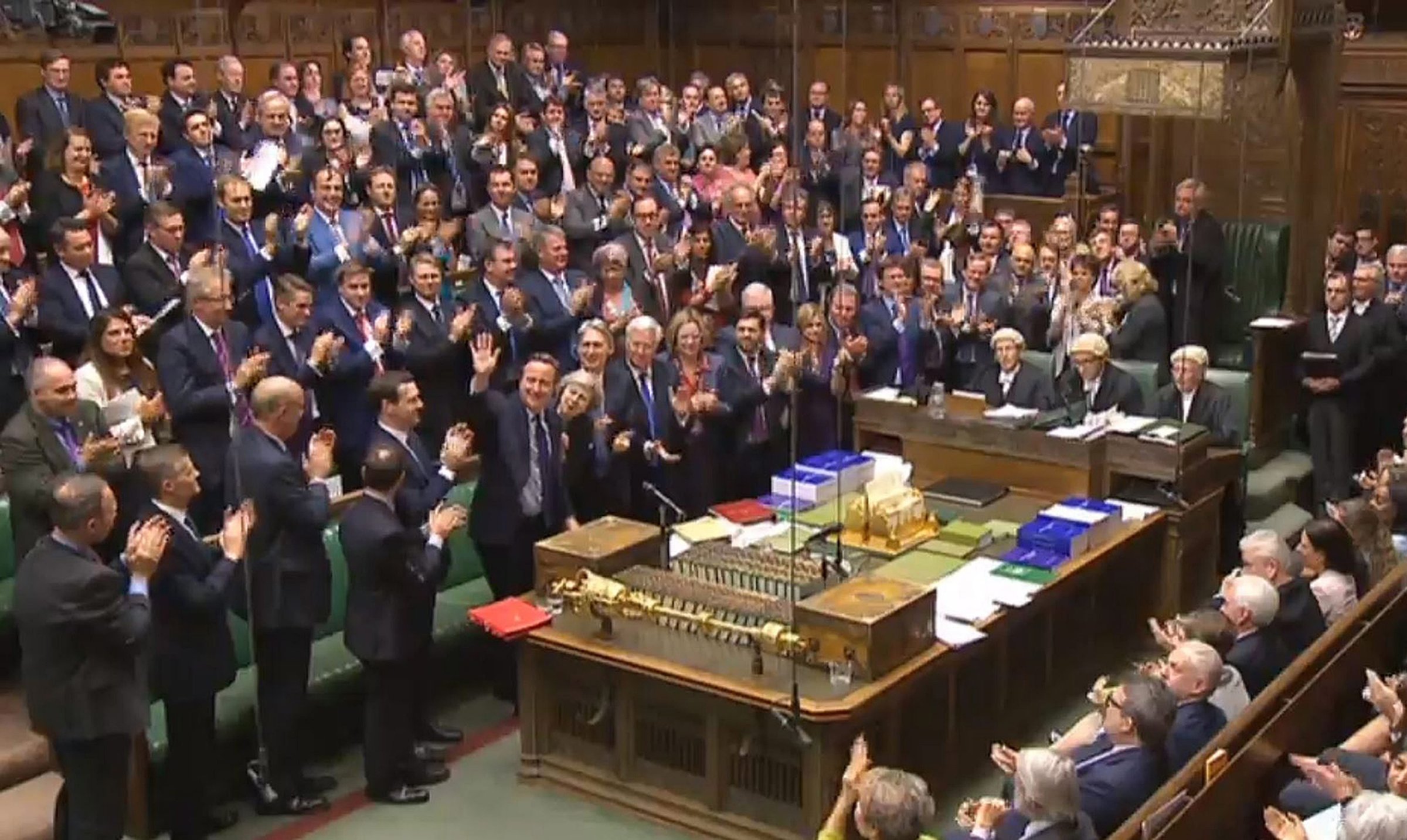
As David Cameron drew his valedictory Prime Minister’s Questions to a close on Wednesday afternoon, he paraphrased a barb he himself had delivered to Tony Blair during his first outing as Leader of the Opposition more than a decade earlier in 2005. ‘He was the future once’ the boyish Cameron had quipped at Blair, who had swept to power on a wave of national optimism in 1997 but was by then visibly worn down by the weight of office.
That Cameron chose self-deprecatingly to remind the House that ‘I was the future once’ is a mark of the ease with which he took to being Prime Minister. Just as he displays little physical evidence that his six years in Downing Street have taken a toll on him, he has not looked diminished by resignation. The upbeat dignity he has shown is in stark contrast to the way some of his predecessors tried to cling on when the writing was already on the wall.
Yet his departure is tinged with regret and a sense that it is all too premature. His premiership has been abruptly cut short by Britain’s shock vote to leave the European Union last month. This is a resignation of necessity not of choice and, at 49 years old, he becomes the youngest Prime Minister to leave office for over a century.
His immediate political bequest is of course what has become known as “Brexit,” but his legacy will prove to be the resuscitation of the Conservative party as an electoral force. His election as party leader signified an acceptance after three successive election defeats that Conservatives needed to change. We had to share the public’s affection for the National Health Service and genuinely commit to policies that had been the preserve of the centre left such as overseas aid and equality for gay people. More than that, we had to recruit more women and ethnic minorities as candidates to look and sounds more like the country we wanted to govern. All those things were done under Cameron’s leadership.
Read more: What David Cameron’s Opponents Say About His Legacy
On becoming Prime Minister in 2010 his crucial first success was to build a solid and stable coalition government with the left-of-center Liberal Democrats. His generosity in offering a fully-fledged joint government rather than a looser agreement was matched by his dexterity in keeping it on track for the full length of the five-year Parliament. Many predicted that a coalition between parties on opposing side of the political divide was doomed to fail. In reality, there was never any moment when it came close to collapsing. The praise for that belongs to Cameron.
The stability the Coalition provided was exactly what the country needed after the turmoil of the financial crisis and allowed the economic recovery to take root. It also enabled the start of wide-ranging public sector reform that has actively devolved powers in health, education and local government away from Westminster. The devolved assemblies in Scotland and Wales have also been considerably strengthened.
As Prime Minister, Cameron knew when to cede ground in the face of unpopular policies, but also when to stand on issues of principle. This was never more evident than in his decision to press on with the introduction of same-sex marriage despite considerable opposition from many of his own MPs and activists. His steadfast commitment to equality was utterly vindicated and proved to mainstream voters that the Conservatives were serious about equal rights.
These domestic and political achievements will stand the test of time, but the ghost at the feast remains the European Union. In his first conference speech as leader, Cameron told the party it had to ‘stop banging on’ about Europe. The party managed it for a while, but the rise of the UK Independence Party (UKIP) during his first term in office prompted him to call their electoral bluff by offering an ‘In/Out’ referendum if re-elected. Cameron won the battle by securing a parliamentary majority in last year’s general election, and limiting UKIP to just one seat. But he lost the war when he lost the referendum, and Britain’s place in the E.U.
Read more: Malcolm Rifkind: David Cameron Will Always Be Remembered for His Brexit Blunders
He has paid the ultimate political price for that loss, but despite that has left the Conservative party remarkably intact, having healed the wounds it inflicted on itself with astonishing speed. While the opposition Labour party slowly implodes with seething tensions and recriminations, the Conservatives have rallied around a new leader and Prime Minister within a fortnight.
Theresa May, Britain’s new Prime Minister, is markedly different to Cameron in her background and demeanor, yet they both share a commitment to equality and justice. As Home Secretary May oversaw the introduction of same-sex marriage, dramatically cut down on police ‘stop and search’ powers which disproportionately targeted the black community, and introduced a Modern Slavery Act to tackle human trafficking.
Although her style will diverge from Cameron’s, she will look to build on his legacy rather than dismantle it. From that, and from his own considerable achievements, David Cameron will be able to draw comfort and pride when he looks back on his time in office.
More Must-Reads from TIME
- Donald Trump Is TIME's 2024 Person of the Year
- Why We Chose Trump as Person of the Year
- Is Intermittent Fasting Good or Bad for You?
- The 100 Must-Read Books of 2024
- The 20 Best Christmas TV Episodes
- Column: If Optimism Feels Ridiculous Now, Try Hope
- The Future of Climate Action Is Trade Policy
- Merle Bombardieri Is Helping People Make the Baby Decision
Contact us at letters@time.com